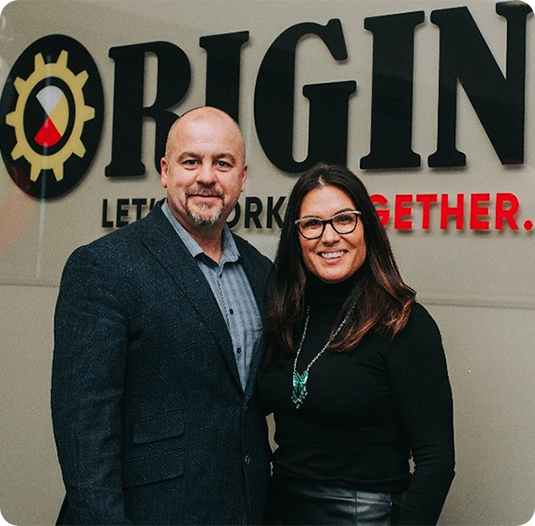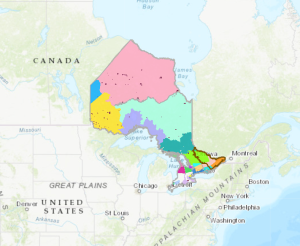Announcements
For press opportunities, please email info@immersivelink.ca.

Fostering Reconciliation through Treaty Relationships
In 2016, Ontario passed the first legislation of its kind in Canada declaring the first full week of November as Treaties Recognition Week.
This annual event honours the importance of treaties and supports our reconciliation journey that is aided by learning more about treaty rights and relationships. By learning more about our collective treaty rights and obligations, we can create greater understanding and nurture relationships between Indigenous and non-Indigenous peoples.
In Indigenous culture, as I’ve mentioned in my other pieces, relationships are of utmost importance. When I think of treaties, relationships and guiding principles that lead to meaningful and sustainable relationships come to mind. But before I share my thoughts on that, I think it is important to provide context to help with your understanding of treaties.

Interactive Treaties Map (link at end of article)
Understanding Indigenous Treaties
When settlers arrived in Canada, Indigenous nations agreed to form treaties with the colonial government, or the Crown. The purpose of these treaties was to allow both parties to live and work together in Canada while respecting each other’s ways of life. For Indigenous people, treaties were meant to be used to confirm rights to Indigenous land, culture, traditions and so on.
The colonial government created policies and laws that went against these treaties. They also saw the treaties as rights to land ownership which went against the intention of the original agreement. As the government went against the true terms of the treaties they also infringed on the rights of Indigenous peoples, as the first people in Canada, and tarnished the relationship that existed.
Now, not all nations formed treaties at this time. For the land not accounted for in the treaties, the colonial government took over and made their own. This overtaking of the land, again, went around the agreements in place and ruined the trust that had been built with First Nations.
Treaties continue to be created today, and are considered “modern treaties”. At this time there are 26 modern treaties with nations across Canada. These treaties include land ownership agreements, access to resources, and supports for improving social and economic development. In comparison to historic treaties, these modern treaties are lengthy written documents representing these agreements.
The Spirit of the Treaties
Indigenous treaties in Canada are founded on a set of principles and values that reflect the core beliefs of Indigenous Nations and form the basis for their relationships with the Canadian Crown. These beliefs include a number of principles and respect would be at the top of the list.
Respect is a fundamental principle that underpins Indigenous treaties. It encompasses respect for Indigenous sovereignty, culture, traditions, and inherent rights. Treaties acknowledge the historical and ongoing presence of Indigenous peoples in their traditional territories and the importance of recognizing our unique identities.
Respect is a fundamental principle that underpins Indigenous treaties. It encompasses respect for Indigenous sovereignty, culture, traditions, and inherent rights.
When I think of what it must of have been like when the first treaties were being drawn up, my mind immediately thinks of the role cooperation played in the treaty making. Indigenous Nations and the Crown came together in a spirit of collaboration to negotiate agreements that address the interests and needs of both parties. When you reflect, this is a common behaviour between parties that involves open dialogue, consensus-building, and a commitment to working together to achieve common goals.
Treaties recognize and uphold the rights of Indigenous Nations. These rights include recognizing our inherent rights to self-determination, self-governance, and the right to maintain and develop our distinct cultures, languages, and traditions. Treaties are a legal mechanism for affirming and protecting these rights.
These principles and values form the foundation of treaty relationships in Canada. They reflect the unique perspectives, histories, and worldviews of Indigenous Nations and serve as a guide for the respectful and equitable coexistence of Indigenous peoples and the Canadian Crown. It is important for all parties involved to honour and uphold these principles to ensure the continued success and integrity of treaty relationships.
Our commitment to Treaty Relationships
When we started our company in 2014, we used similar principles to guide our work with Indigenous communities, organizations and industry partners.
Starting with our “First Peoples First “process to support self and career exploration and the ongoing development of new immersive experiences, we are committed to being a bridge to support reconciliation through these guiding principles.
There is great value in understanding treaties. It can help in better understanding Indigenous peoples, the current relationship with the Canadian government, and how you can support moving forward. In the workplace, corporations can lack the insight and understanding how to respectfully engage with First Nations, develop partnerships, or work with their Indigenous workforce.
With our team’s combined years of experience working directly with First Nations, we have an understanding of the challenges that are faced when it comes to employment, training, and workforce development. As a step towards our vision of working towards economic reconciliation in Canada, our team can support organizations and Corporate Canada in building a strategy for Indigenous engagement that incorporates an Indigenous perspective and ensures that any approach is respectful of cultural traditions and approaches to doing business.
For more information on Indigenous Engagement services, visit:
https://immersivelink.ca/indigenous-engagement/
__________________________________________________________________________________________
